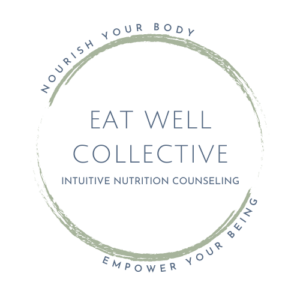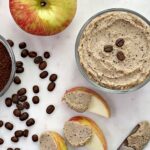With all of the information out in the world, it can be difficult to decipher what are facts and what are simply myths. Social media is a popular place to see some of this information as an intrigued audience to learn anything and everything that may improve our lives and health. Even aside from social media, it can still sometimes seem like we are constantly bogged down with diet culture messages, being as they exist not only on social media but also in daily conversations, TV shows, etc. Today, we are going to help debunk a few common food and body-related beliefs that are in fact – myths.
Common food and body-related beliefs + how to debunk them:
“I will gain weight if I eat certain types of foods.”
Let’s debunk!
There actually is no one food that will either cause weight gain or weight loss. It is the culmination of foods and our intentions behind our food choices that matter and impact our overall health. At EWWG, we strive to help you find what will curate a healthy lifestyle for you as an individual, regardless of diet culture messages and myths.
“I can slow down my metabolism by eating less.”
By eating less, the body actually slows down metabolism instead of speeding it up. When the body is not receiving enough nutrition to adequately fuel our brain and bodies, it resorts to slowing down our metabolism (or the rate at which we use energy) to conserve as much energy as possible for all of our body’s functions. This may mean that the body is functioning at 90% instead of 100%, for instance.
“If I wait to eat until later in the day, I’ll end up eating less.”
If your eating is pushed off or if you delay your mealtimes (such as intermittent fasting), this could result in eating even more later in the day. When our bodies are restricted from either an adequate amount of food or satisfaction from meals, they can often wind up having urges to binge later in the day. This may result in guilt/shame or feeling “out of control.” This is the body’s natural survival mechanism to give a reminder of “hey, I actually need more food than that” or “I don’t feel satisfied or have enjoyment from the meal we had.”
“Exercise is an appetite suppressant.”
Exercise is actually quite the opposite – it increases appetite to help replenish energy that was used during the activity. Again, this is the body giving your brain a reminder in the form of a hunger cue to tell us what it needs and/or wants. If these reminders are often ignored, sometimes these cues can become less and less noticeable as we continue to disconnect from our bodies. This can often become very confusing and dangerous when we are not properly caring for and responding to what our bodies are trying to tell us.
“High-protein, low-carb diets are a healthy way to lose weight.”
Carbohydrates are our bodies’ favorite fuel source for creating energy, storing energy, and sparing other macronutrients (proteins and fats) for their own duties. With all of the responsibilities carbs have, they should make up about 45-65% of our total intake. When our bodies do not receive enough carbs from food for energy, it must turn to other sources, like stored energy, proteins, and fats, leaving the duties of these other sources in the dust.
Continuing to challenge the messages of diet culture is a great way to reflect on what living a healthy lifestyle means for you as an individual and taking the “should” and “should nots” out of the conversation when determining this.



